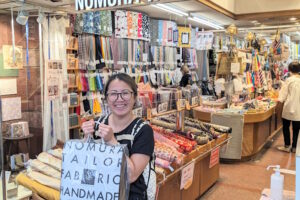
Before planning for this trip, Andrew’s knowledge of the Japanese language was solely based on the countless hours of anime he’s consumed in his life (and the minuscule amount of time he spent on Duolingo). His accent and knowledge of basic words weren’t too bad, but he wanted to dedicate more time and effort to learning. It’s a language he’s always wanted to learn so this trip was a great reason for him to get started.
Duolingo wasn’t enough for this task (and was also super hard since Japanese has three character-based written alphabets) so Andrew found a private tutor on Preply. Neither of us had any experience with Preply before, but a coworker recommended it to him and we’ve been impressed with how well Andrew’s lessons have been going.
Andrew, being who he is, heavily front-loaded his lessons to try to get as much in as possible. He ended up decreasing his lesson and study time after the initial burnout, but he kept going with at least one lesson per week for two months. By the time our trip came around, he’d rate himself 2 out of 10 on language skills and was able to navigate some tricky situations in Japan.
The rest of us, on the other hand, were hovering right at zero in language skills. Jadon and Isabelle know how to speak, read, and write Mandarin Chinese (which one of the Japanese alphabets, Kanji, is adapted from), but that was not surprisingly unhelpful in Japan.
If you’re staying in the cities and touristy areas, you’ll see signs and hear announcements translated into English and Mandarin on the buses and trains, but most people you talk to will have very limited English skills, if any. They’re usually incredibly patient and will figure out what you need (or find someone who can), but it’s a lot smoother to have some language skills even if it’s to say excuse me (sumimasen) or thank you (arigato).
Japanese Phrases to Learn
- Sumimasen. Excuse me. Can also be used as a thank you.
- Kudasai. Please. Especially useful when ordering. For example, you can point to the menu item and say kudasai. If ordering more than one of an item, hold up the number of fingers you want too.
- Arigato. Thank you.
- Dozo. Here you go/ here you are. You’ll hear this when someone is giving something to you, like a bag. Or if they’re ready for you or acknowledging you.
While not strictly necessary, I recommend practicing these basic phrases at home as a show of respect when you visit Japan. You’ll hear these phrases often and will find plenty of circumstances where you can use them. Speak them out loud and get used to hearing/saying them. It’s one thing to know what the word is at home. It’s a completely different thing to feel comfortable enough saying it in a foreign environment.
Learning a few phrases with your kids also helps them understand and appreciate the culture they’re about to be immersed in. Throughout our trip, we were able to pick out these common phrases and more while listening to various announcements on buses and trains.
Not Fluent in the Language?
If you’re worried about visiting a place where you don’t speak the language, Japan is a great place to go. Their welcoming and kind culture quickly eased our worries away.
Not knowing the language in a foreign country was obviously our biggest concern. Having one person in the group with basic knowledge alleviated our worries, but there was only so much Andrew could do with his newfound skills. Fortunately, we felt incredibly welcome in Japan and didn’t feel like our lack of language skills was a major pain point. Most of the people we encountered were exceptionally accepting and we all felt comfortable navigating interactions quickly. It was honestly amazing to see how well we could communicate with nothing more than patience, compassion, and hand gestures.
If you’re in need of someone who understands English, you’ll likely find that most common in Tokyo in the most touristy of places. Even if you don’t find someone who understands English, you’ll still easily find someone who is willing to help however they can. Just be sure to cut your sentences down to the most important details so they can guide you in the right direction.
For practicality, be sure to have Google Translate (or another way to translate) on hand in more complex situations. No matter what, you’ll find that the kindness of strangers in Japan is not exaggerated and that you’ll adapt to your surroundings.
If you want to read more, find all my Japan posts here and all my travel posts here.
Thanks for reading!





Leave a Reply
Your email is safe with us.